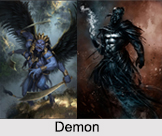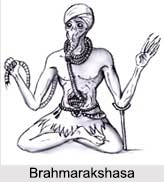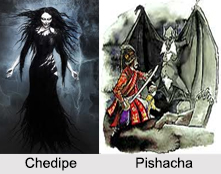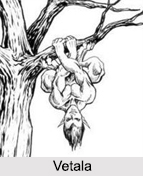 Demon, in Indian Mythology, has been described as a supernatural being with bad qualities. All over India, these demons are believed to exist. Almost every Hindu works contain the reference of these malicious or mischievous demons. The demons may either be male or female, of low or high caste, of Hindu or foreign lineage. All demons are however, powerful, malicious and interfering and all are desirous of bloody sacrifices and frantic dances.
Demon, in Indian Mythology, has been described as a supernatural being with bad qualities. All over India, these demons are believed to exist. Almost every Hindu works contain the reference of these malicious or mischievous demons. The demons may either be male or female, of low or high caste, of Hindu or foreign lineage. All demons are however, powerful, malicious and interfering and all are desirous of bloody sacrifices and frantic dances.
According to the Hindu mythology, the demons have the same status as the humans and Gods. Gods, demons and humans are considered as the children of Lord Brahma who is the creator of the Universe.
Concept of Demons in India
There are different legends from every part of India about the malicious acts of demons and their worships. Many primitive tribes worship the demons like Gods and Goddesses. In all Brahmanical myths, the demons are represented as the ancient enemies of the Gods, as warring against the Gods. The demons are described there as the inventors and special patrons of bloody sacrifices. Every deity gains phenomenal victories over the demons and somehow they never are conquered.
Indian mythology has also broadly categorized these demons which are as follows:
Bhoot: Bhoot is believed to be a supernatural creature which is the ghost of a deceased person. Their mention can be found in the ancient Indian texts. The interpretation of their existence varies with different religions and communities but the common feature of their restless and perturbed nature has also been defined which owes to some factors which prevents them from moving on to heaven or hell as per the traditions. The reason could be a violent death, failure of their survivors to perform proper funerals and unsettled matters in their lives.
 Brahmarakshasa: Hindu mythology defines Brahmarakshasa as fierce demon spirits. These are believed to be the spirit of a Brahmin or a dead scholar of high birth who has misused his knowledge or has performed evil deeds. A scholar who does not perform his earth-bound duties of dissipating his knowledge becomes a Brahmarakshasa after death. These spirits have immense power and only few exist in the world who can give themselves salvation from this form. They also possess the knowledge of Vedas, Puranas and past lives.
Brahmarakshasa: Hindu mythology defines Brahmarakshasa as fierce demon spirits. These are believed to be the spirit of a Brahmin or a dead scholar of high birth who has misused his knowledge or has performed evil deeds. A scholar who does not perform his earth-bound duties of dissipating his knowledge becomes a Brahmarakshasa after death. These spirits have immense power and only few exist in the world who can give themselves salvation from this form. They also possess the knowledge of Vedas, Puranas and past lives.
 Chedipe: Chedipe is a witch-vampire as per the Hindu Mythology which exists in the folklore of the region around the Godavari River in India. Their association can be traced to the time of Devdasis in Hindu temples. Women suffering unnatural death often become Chedipe. These spirits rides tiger in the moonlit night. Legends said that the Chedipe was a sort of seductress who brings impurity into the home. They visited houses at night, naked, had hypnotic power, cast a spell on the house residents and suck blood from men from their toes.
Chedipe: Chedipe is a witch-vampire as per the Hindu Mythology which exists in the folklore of the region around the Godavari River in India. Their association can be traced to the time of Devdasis in Hindu temples. Women suffering unnatural death often become Chedipe. These spirits rides tiger in the moonlit night. Legends said that the Chedipe was a sort of seductress who brings impurity into the home. They visited houses at night, naked, had hypnotic power, cast a spell on the house residents and suck blood from men from their toes.
Churail: Churail is a female ghost as per the Hindu mythology. They have been described with hideous and terrible appearances. Churail also appears in the devious disguise of a youthful and beautiful maiden. They are often known to be found around graveyards, abandoned battlefields, tombs, crossroads, etc. According to some legends, a woman who dies during childbirth or pregnancy or due to suffering at the hands of her in-laws will come back as a Churel to seek revenge, particularly targeting the males in her family.
 Pishacha: Pishacha has been defined by the Hindu mythology as flesh-eating demons. The origin of these demons are shrouded in mystery, however some people believe that they have been created by Lord Brahma. Their description figures them with dark complexion, bulging veins and protruding red eyes. Pishachas also possess the power to take up different forms at will along with being invisible. They are believed to feed on human energies and many a times possess human beings, altering their thoughts. They are blamed as the cause of many illnesses.
Pishacha: Pishacha has been defined by the Hindu mythology as flesh-eating demons. The origin of these demons are shrouded in mystery, however some people believe that they have been created by Lord Brahma. Their description figures them with dark complexion, bulging veins and protruding red eyes. Pishachas also possess the power to take up different forms at will along with being invisible. They are believed to feed on human energies and many a times possess human beings, altering their thoughts. They are blamed as the cause of many illnesses.
Preta: Preta is described in Hindu mythology as a type of being which have formed after undergoing more than human suffering, especially extreme degree of hunger and thirst. It is believed that due to their greed, jealousy, deceit, corruption and false deed in a previous life; they are afflicted with an unquenchable hunger for a specific substance or object. Although they are invisible to human eye, they are sometimes discernable in certain mental states. Preta have been often described as human-like but have thin necks, narrow limbs and mummified skin.
Vetala: Vetala is another demon from Hindu mythology which can be defined as spirits dwelling in corpses and charnel grounds. The corpses may be used by them as vehicles for movement. However a Vetala may also leave the body at will. They can be a blood drinker, a flesh eater or a vampire. Hindu folklore states that they haunt cemeteries and takes demonic possession of corpses. They convey their displeasure by troubling humans. They are believed to haunt forests and sleep by hanging themselves upside down from trees like bats.
In the Hindu mythology, there are many demons. People governed by such evil entities are demons too.









